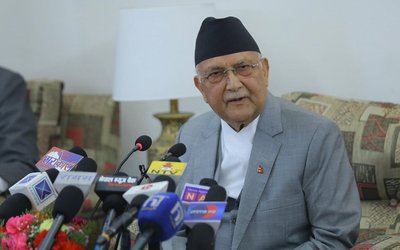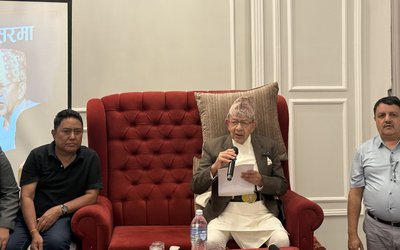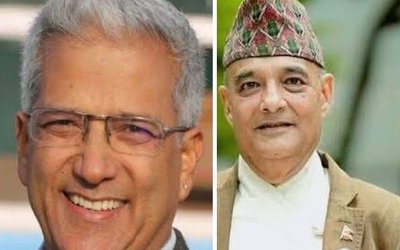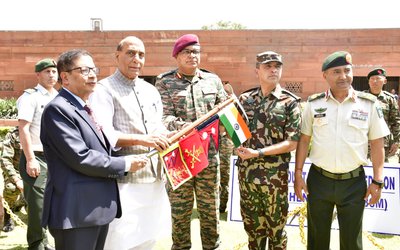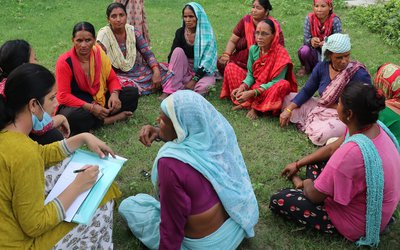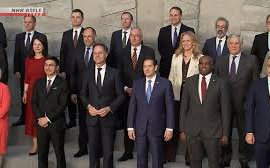
China and India are emerging as major economic powers of the world. As other powers are keenly watching their development, enormous opportunities as well as challenges exist for Nepal in their progress.
Despite improvements of bilateral relations between India and China, fewer chances are there for an immediate harmonization of their relations. Situated between the two competing powers, Nepal will not find it easy to handle its delicate relations with its close neighbors.
Nepal has been supporting China’s one road and one belt initiative as it will greatly help in diversifying the connectivity to the outside world. However, Nepal is in no position to influence the process much.
In a 2-day conference organized by Asian think tanks - South Asian Institute of Management (SAIM), Institute for Integrated Development Studies (IIDS), S. Rajaratnam School of International Studies (RSI) and Nanyang Technological University, experts from Nepal, India and China discussed ways to develop a trilateral cooperation.
Following the visit of Nepalese prime minister K.P.Sharma Oli to China, Nepal is pushing to increase the connectivity with China via roads and rails. Prime minister Oli has even requested the Chinese leadership to connect Nepal by rail. As China is expanding the railway up to Nepalese border, rail connectivity is not far away. Given the present state of India-China relations, however, there is still a long time before the trilateral railway connectivity takes shape.
At the International Conference on Key Trends in China-Nepal-India Relations and New Development Strategy for Nepal, the experts stressed on enhancing railway and road connectivity among the three neighbors.
Experts argued that trilateral cooperation on economic issues among China, Nepal and India will greatly benefit the development of the entire South Asia region.
"Nepal can act as a vibrant bridge between China and India which are the two emerging economies of the World," Nepal's Former Foreign Minister Prakash Chandra Lohani said. "Enhancing roads and railways connectivity among the three countries should be the topmost priority which will greatly contribute to make the entire Asia region prosperous."
The trilateral partnership among these three countries has become imperative in the changed global context, he said, adding that they should work for developing the Trans-Himalayan Railways.
“China-proposed Belt and Road initiative is highly important for neighboring countries like Nepal,” said former minister Dr. Lohani.
While delivering a speech at the conference, Professor at China's Sichuan University Dai Yonghong highlighted China's willingness to enhance partnership with India, Nepal and other neighboring countries for economic prosperity in the region.
"China has established the Asian Infrastructure Investment Bank and taken forward the Belt and Road initiative and both the initiatives are meant for enhancing economic cooperation between China and the rest of other countries of the World,” said Professor Dai Yonghong. “China will happily welcome participation in these key initiatives.”
Although Indian scholars have maintained certain reservations on one belt one road initiative, Chinese scholars are open. "One Belt One Road Initiative will create a win-win situation among China and other countries of the world which will be part of it," said the Chinese professor.
“China needs to come out with a clear policy on how can it accommodate other South Asian countries and how it can benefit others. There is also the need to see how the one belt one road initiative will mean to all,” said former Indian ambassador to Nepal Rakesh Sood.
“One road one belt initiative can benefit Nepal as it will give Nepal an alternative transit route,” said former finance minister Madhukar Sumsher Rana. Indian professor at the Jawaharlal Nehru University Mahendra Lama presented a paper entitled "Relocating Electricity Inter-connections in Nepal-India-China Tri-Junction."
Former water resource minister Deepak Gyawali also presented his paper on how Nepal's water resources reduce dependency of fossil fuels. Gyawali argued that Nepal needs to harness water resources.
"There are many examples worldwide of grids of neighboring countries being interconnected for exchange of power," said professor Lama. "We can also work together, between Nepal, India and China. India can take the lead in forming a Nepal-India-China tri-junction consortium to help in attracting regional and sub-regional investment partners."
With huge investments, China is moving to build the one road one belt initiative, coming closer to all South Asian countries. The nature of China and India’s bilateral relations and understanding will determine its future.

Keshab Poudel
Poudel is the editor of New Spotlight Magazine.
- FM Dr. Deuba’s India Visit: Mission Aborted
- Mar 26, 2025
- AMBASSADOR MAEDA TORU: Warm Regards
- Mar 24, 2025
- PRO-MONARCHY MOVEMENT: Rising Dissatisfaction
- Mar 23, 2025
- Dr. PRABIN MANANDHAR: Person With Humility
- Mar 16, 2025
- US SUSPESION OF GRANT: Impact On Nepal
- Mar 10, 2025
